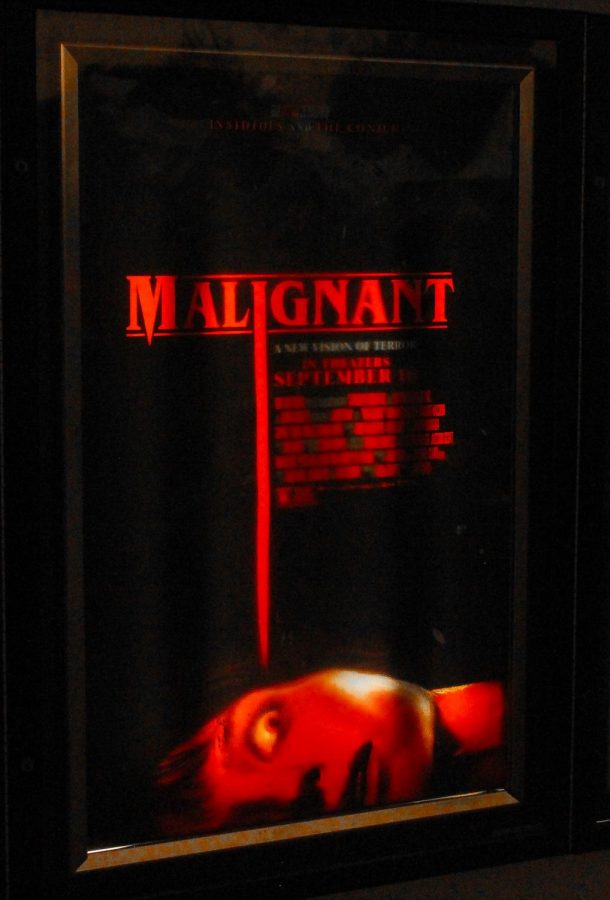Horror Icon James Wan releases his second project of the year, Malignant, a story that starts as typical but ends as robustly original
September 17, 2021
In a cancerous play on words, James Wan releases his second, and not nearly as followed, horror-centric film of the 2021 year: Malignant. Following the summer addition of The Conjuring: The Devil Made Me Do It to Wan’s supernatural horror franchise, The Conjuring Universe, Malignant remains in the world of Wan’s talents in all things that scare, spook and disturb.
A reputation of horror hits, with Wan being the founder of both the Saw and Conjuring franchises along with a dip into the domain of superhero’s, in DC’s live action Aquaman (2018), have cemented the creative mind of Wan and his talents in film history.
In a step away from the notable franchises in Wan’s film stat sheet, Malignant is a complete separate entity to all the previous films of the director, holding no connection to the many other projects of the horror mogul.
Malignant as a title is well suited for the movie in relation to the plot’s pace, with the film moving at a slow, predictable speed until it surpasses its lacking traits through an unforeseen string of events.
The opening scenes of the film give a brief and disturbing look at the villain of the story, quickly jumping to the present soon after.
At a suburban house in Seattle that is tactlessly dashed with a coat of all things sinister and superstitious, the main character Madison is shown to be both the bearer of an unborn child and the victim of an abusive partner.
Soon after the opening segments of the film, people begin to die painful and demented deaths, as expected in a horror movie.
As Madison’s dreams place her in the spot of witness to a series of unholy killings, police officers begin to pour into the storyboard of Malignant, using the character Detective Kekua Shaw as the expositional guru to reveal the twists and turns of the narrative. In a closing act that moves as maliciously as a cancerous growth, Malignant transitions from being a typical horror riff of body horror and gore, to a truly individualized concept centered around a parasitic storyline.
The uplifting effects of the lasting third of the film can make up for some of the several mistakes made in the other two-thirds of the story, but not enough for it to be applauded. In a beginning that in terms of horror, holds the work of cliches, Malignant begins as a drag upon the talents of Wan.
In a second act that sets the mold for the finale, improvements in all things fear are gradually on the uptick, growing into the film’s final phase that is a period of unceasing death, destruction, derangement and all those words that may express the festival of fear that is Malignant’s ending.
Acting that is sub-par at best is expected from a genre that is characteristically focused more on making its audience queasy rather than enlightened, but Malignant’s story seems otherwise senseless when spread through the dialogue of its C to D-list cast.
It is in moments of silence and unease that the vision of Wan is no longer slandered by the impartial line readings of its actors, allowing the master to do that which has earned him his acclaim, providing an unsettling exhibition of horror among its many elements.
As a creator who has shown time and time again that he understands the material of terror and all ways to create it, Wan delivers a story that at first seems invested to be anything other than noteworthy, but swiftly turns the page to an ingenious form of storytelling that he can tack on to the abilities he holds in his personal Arsenal.
Malignant offers a step away from the common grounds of franchised horror, being an original story, with an original premise, and its own respective successes. While it takes some time for the narrative to fit into the shoes that Wan’s previous ventures have filled, its ending provides a closing act that can rival the outlandishness of any of Wan’s former projects.
With a riveting finish that solidifies Malignant in the catalogue of Wan, anyone with a bit of patience will be happy with the pay-off that is its conclusion. A conclusion, I might add, that did succeed at making me queasy.




























